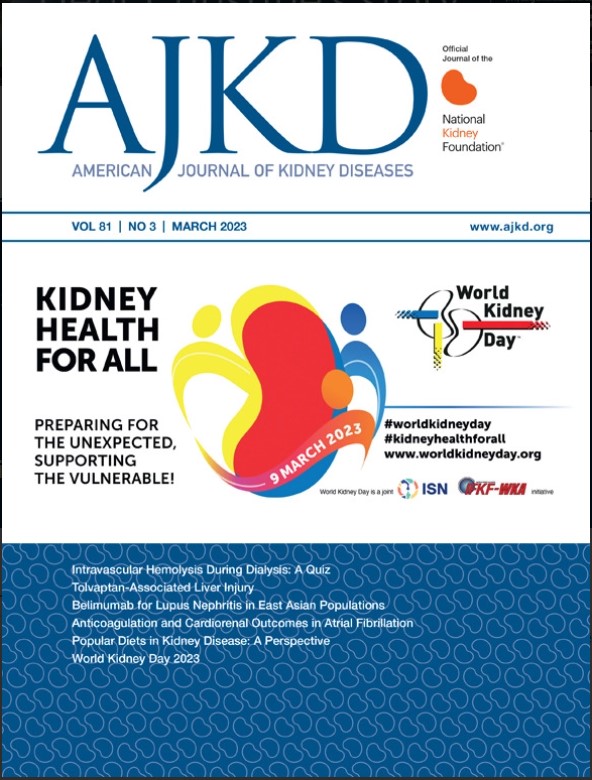定量APOL1、人类白细胞抗原和其他遗传因素对不明原因肾衰竭的影响。
IF 8.2
1区 医学
Q1 UROLOGY & NEPHROLOGY
引用次数: 0
摘要
原因与目的不明原因肾衰竭(uKF)影响了15%需要肾脏替代治疗的个体。缺乏明确的诊断造成了复发、家族风险和试验资格的不确定性。这项研究试图确定uKF的遗传变异。研究设计基因组分析使用全基因组测序(WGS)进行,由一个多学科小组审查,确定候选致病变异。对单基因和结构变异进行病例对照研究,进行基于基因和多基因的风险评分关联检测。背景和参与者:该研究从英国10万人基因组计划中招募了218名50岁之前患有uKF的患者。对临床分析未解决的180例uKF患者进行关联分析,组成非单基因uKF队列(NM-uKF)。26,373例对照来自非肾先证者的未受影响亲属。在218名招募的患者中,537个基因的候选变异在结构和单变异水平上进行了评估,这些基因是慢性肾脏疾病和各种肾小球肾炎的高风险APOL1基因型和多基因风险评分。主要结果是建立遗传诊断以及遗传结果、年龄、家族史和祖先之间的关联。分析方法对候选变异进行致病性审查。进行基因分析和结构变异分析以及APOL1高危基因型评估。多基因风险评分和事后HLA关联也被调查。结果218例患者中有38例(17%)使用WGS通过100,000基因组计划的临床分支进行了单基因诊断。uKF发病中位数为36年。无论家族史如何,36岁及以上的患者诊断较少。3例无家族史的老年患者有IV型胶原蛋白基因的致病变异。在最近非洲血统的个体中,高危APOL1基因型在uKF患者中更为常见(52% vs. 8.4%, P<0.001)。APOL1高危基因型和uKF患者的类固醇敏感肾病综合征(SSNS)多基因风险评分升高,部分原因是HLA-DQB1*03:19的差异。局限性潜在的局限性包括子组规模小和使用短读WGS。结论:在17%的uKF患者中,swgs产生了单基因诊断,病例对照分析中没有出现额外的解决病例。这些发现强调了APOL1在最近非洲血统人群中的作用,并提示了一种不同于常见慢性肾脏疾病的遗传结构。本文章由计算机程序翻译,如有差异,请以英文原文为准。
Quantifying APOL1, Human Leukocyte Antigen, and Other Genetic Contributions to Unexplained Kidney Failure.
RATIONALE & OBJECTIVE
Unexplained kidney failure (uKF) affects 15% of individuals needing kidney replacement therapy. The lack of a clear diagnosis creates uncertainty about recurrence, familial risk, and trial eligibility. This study sought to identify genetic variants underlying uKF.
STUDY DESIGN
Genomic analyses were conducted using whole genome sequencing (WGS) that were reviewed by a multidisciplinary team who identified candidate pathogenic variants. A case-control study was implemented for single and structural variants to perform gene-based and polygenic risk score association testing.
SETTING & PARTICIPANTS
The study recruited 218 patients with uKF onset before age 50 from the UK's 100,000 Genomes Project. Association analysis was performed in 180 uKF cases who remained unsolved after clinical analysis and constituted the non-monogenic uKF cohort (NM-uKF). 26,373 controls were derived from the unaffected relatives of non-renal probands.
EXPOSURES
Candidate variants in 537 genes were assessed at a structural and single variant level in the 218 recruited patients as were high-risk APOL1 genotypes and polygenic risk scores for chronic kidney disease and various glomerulonephritides.
OUTCOME
The primary outcomes were establishing a genetic diagnosis and the associations between genetic findings, age, family history, and ancestry.
ANALYTICAL APPROACH
Candidate variants were reviewed for pathogenicity. Gene-based and structural variant analyses and high-risk APOL1 genotype assessments were performed. Polygenic risk scores and post-hoc HLA associations were also investigated.
RESULTS
Monogenic diagnoses were made in 38 of 218 patients (17%) using WGS via the clinical arm of the 100,000 Genomes Project. Median uKF onset was 36 years. Diagnoses were less frequent in patients aged 36 or older, irrespective of family history. Three older patients without a family history had pathogenic variants in type IV collagen genes. Among individuals with recent African ancestry, high-risk APOL1 genotypes were significantly more common in those with uKF (52% vs. 8.4% in those without uKF, P<0.001). An elevated steroid sensitive nephrotic syndrome (SSNS) polygenic risk score was observed in those with high-risk APOL1 genotypes and uKF, partly due to differences at HLA-DQB1*03:19.
LIMITATIONS
Potential limitations include the small sizes of subgroups and use of short-read WGS.
CONCLUSIONS
WGS yielded a monogenic diagnosis in 17% of patients with uKF, with no additional solved cases arising from the case-control analysis. These findings underscore APOL1's role in those with recent African ancestry and suggest a genetic architecture distinct from common chronic kidney disease.
求助全文
通过发布文献求助,成功后即可免费获取论文全文。
去求助
来源期刊

American Journal of Kidney Diseases
医学-泌尿学与肾脏学
CiteScore
20.40
自引率
2.30%
发文量
732
审稿时长
3-8 weeks
期刊介绍:
The American Journal of Kidney Diseases (AJKD), the National Kidney Foundation's official journal, is globally recognized for its leadership in clinical nephrology content. Monthly, AJKD publishes original investigations on kidney diseases, hypertension, dialysis therapies, and kidney transplantation. Rigorous peer-review, statistical scrutiny, and a structured format characterize the publication process. Each issue includes case reports unveiling new diseases and potential therapeutic strategies.
 求助内容:
求助内容: 应助结果提醒方式:
应助结果提醒方式:


